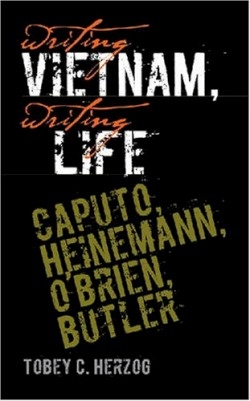It looks like you've stumbled upon a page meant to be read by our code instead of viewed directly. You're probably looking for this page.
Writing Vietnam, Writing Life
Caputo, Heinemann, O'Brien, Butler
“If you can write a good war story, you could write anything,” says Larry Heinemann, one of the four authors included in this collection of interviews conducted by Herzog in 2005. Herzog, like the authors interviewed, is a Vietnam vet; he’s also an English professor at Wabash (Indiana) College and the author of Vietnam War Stories: Innocence Lost. These particular authors were chosen because they have themselves written enduring, timeless war stories, which according Herzog, “present engaging characters, psychological realism, and moral gravity. Most important, these stories reach readers at gut level.”
Each author is questioned about his roles as a son, a soldier, and a writer. Herzog then explores the shadowy relationship between memory and imagination. Also included are most helpful chronologies of the authors’ lives, which clarify the dialogue between Herzog and the writers. Caputo, the only commissioned officer, served in Vietnam from 1965-66; Heinemann served from 1967-68; Tim O’Brien from 1969-70; and Butler in 1971.
Interestingly, the writers, with the exception of Butler, all express a “heart of darkness theme,” in which the soldiers in their novels show a dark side—a loss of humanity—as they struggle to survive the living hell of combat. Butler displays a different approach, as shown in his 2003 Pulitzer Prize-winning collection of stories, A Good Scent from a Strange Mountain. More than any other American author, he successfully portrays the war through the lives of the Vietnamese. Butler is the only author in this book who spoke Vietnamese and he developed a love for the county’s people and culture. Something else that differentiates him is that he spent his tour in counterintelligence and was not in combat like the other three writers.
The ten-page conclusion is an important part of the book because in it Herzog ties together nicely the often-rambling (and unavoidable) interviews. Despite being men from different backgrounds, all agree that it was the war that made them writers, and all display a varying degree of cynicism about the government.
This book is aimed for aspiring creative writers who want to learn more about writing techniques. It is also useful for established authors, especially those who have written about war. The dialogue elicited from Herzog’s thought-provoking questions will reward both audiences.
Disclosure: This article is not an endorsement, but a review. The publisher of this book provided free copies of the book to have their book reviewed by a professional reviewer. No fee was paid by the publisher for this review. Foreword Reviews only recommends books that we love. Foreword Magazine, Inc. is disclosing this in accordance with the Federal Trade Commission’s 16 CFR, Part 255.
